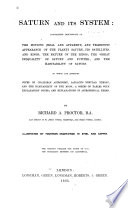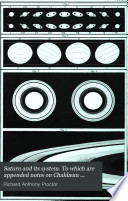 that every particle of matter in the universe attracts every other particle, with a force whose direction is that of the line joining the two, and whose magnitude is directly as the product of their masses, and inversely as the square of their distances... that every particle of matter in the universe attracts every other particle, with a force whose direction is that of the line joining the two, and whose magnitude is directly as the product of their masses, and inversely as the square of their distances...  The Elements of Physics - Page 91by Thomas Webster - 1837 - 490 pagesFull view The Elements of Physics - Page 91by Thomas Webster - 1837 - 490 pagesFull view - About this book
 | James Sanford Lamar - 1860 - 336 pages
...terrestrial gravitation, previously established, he arrived at a still more general conclusion, namely, that every particle of matter in the universe attracts every other particle with a force proportional to the product of their masses directly, and the square of their mutual distance inversely,... | |
 | John Lockhart (of Kirkcaldy.) - 1862 - 216 pages
...bodies are attracted towards its centre. By that universal attraction (of gravitation) by which ? " Every particle of matter in the universe attracts every other particle, with a force directly proportioned to the mass of the attracting particle, and inversely to the square of the distance... | |
 | Thomas Rawson Birks - 1862 - 254 pages
...the known phenomena of physical change. CHAPTER I. ON MATTER AND ETHER. 1. EVERY particle of matter attracts every other particle, with a force varying inversely as the square of the distance between them. This is the great discovery of Newton, which must form the natural starting... | |
 | 1863 - 852 pages
...afterwards mentioned, Newton is understood to have at first rested his law of universal gravitation : ' Every particle of matter in the universe attracts every other particle with a force directly proportioned to the mass of the attracting particle, and inversely to the square of the distance... | |
 | Royal United Services Institute for Defence Studies - 1863 - 778 pages
...subject to one source of great uncertainty. Newton laid down the law of universal gravitation, " That every particle of matter in the universe attracts every other particle with a force directly proportionate to the mass of the attracting particle, and inversely to the square of the distance... | |
 | William Hughes - 1864 - 188 pages
...exert give rise to all the celestial phenomena. Universal Gravitation is, then, the principle that " every particle of matter in the universe attracts every other particle, with a force which is inversely poportional to the square of the distance between them" or, in other words, with... | |
 | Richard Anthony Proctor - 1865 - 302 pages
...Newton—the last to rush from particular phenomena to general theories—in the grand cosmical law :—' Every particle of matter in the universe attracts every other particle with a force varying directly as the product of the masses and inversely as the square of the distance.' Under this law... | |
 | Richard Anthony Proctor - 1865 - 312 pages
...the last to rush from particular phenomena to general theories— in the grand cosmical law : — ' Every particle of matter in the universe attracts every other particle with a force varying directly as the product of the masses and inversely as the square of the distance.' Under this law... | |
 | Louis Figuier - 1866 - 542 pages
...which render it prohable that it is derivative. The law of gravitation enunciated by Newton is, that every particle of matter in the universe attracts every other particle with a force which diminishes as the square of the distance increases. Under this law a stone falls to the ground... | |
 | Albert Taylor Bledsoe, Sophia M'Ilvaine Bledsoe Herrick - 1870 - 560 pages
...identical with the law itself, and not something different from it. Thus, for example, the fact that every particle of matter in the universe attracts every other particle with a certain force, is the law of gravity. The observance is the law, and the law is the observance. There... | |
| |